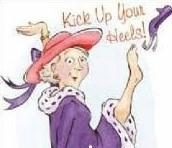By Sabine Ebanks, Year 13
LGB’s beloved former Head of English, Mrs. Alison Murray, retired at the end of the last school year. The following is an interview conducted by the Express before she left on highlights from her career and her time at LGB. Many thanks to Mrs. Murray for her time, and best wishes in her retirement!
How long have you been teaching, and how long have you been at LGB?
I started teaching in 1981. Apart from a year off for [the birth of] each of my two daughters,
and six months after I moved to Geneva, I have taught for close on 40 years. I
have been at LGB for 17 years.
Why did you become a teacher? Was it something you always wanted to do?
Actually, I only considered teaching after I had completed my Bachelor’s
Degree. I went to a presentation at the University to learn more about post-
graduate studies and was inspired by the Dean of the School of Education. Up until
then, I had wanted to do all sorts of things ranging from (at age 6) being a
ballerina to an air stewardess to a psychiatrist! I am so happy that I settled on
teaching! I’m a useless dancer, a nervous flyer and already a bit mad so the
other options would have been disastrous!
How has teaching changed since you started?
It’s changed enormously! The most striking changes have been in terms of
teaching aids in the classroom. In my early days, we had no such thing as a
photocopier, believe it or not! Handouts, worksheets, and exam papers were all
copied by means of a Roneo machine – teachers had to handwrite or type a
master copy on wax stencil paper which would then be wrapped around a drum
which we would cover with purple ink, and then turn a handle and print each
copy! From that to overhead projectors to computers to interactive smartboards
boggles the mind! Students didn’t have computers (nor did the teachers) and so
used library books for research. Work was always handwritten in those
days, and if you made an error you had to start over. We had to write all our
reports by hand, too! But more importantly, while curriculum content may
change, or syllabus requirements may change, or pedagogy may change, what
remains constant is the pleasure of interacting with young people and being
amazed every day by them.
What has been the most rewarding thing about being a teacher?
As I said, it’s the enjoyment that comes through the interaction with students
that is noteworthy. But also, the fact that even though every day looks similar on
a timetable, no day is predictable. Nor is every class. I may have taught
Macbeth over 30 times but every time is different – no two classes are ever the
same and that is the joy of the job. It is also enormously rewarding when a
student has a ‘light-bulb moment’ and it’s really good to see expressions on
faces when a good grade is returned. I can’t single out one thing that is the
most rewarding – it is (almost) everything.
What is something you might not miss so much about your work?
Sunday marking. I have always tried to take what I call a ‘sacred Saturday’
but I usually catch up with preparation or marking on Sundays. It’ll be fab to
have a two-day weekend!
Can you share some of your fondest memories from your time at LGB?
I have so many that to highlight only a few is really difficult. But what stands
out as really memorable, having come from South Africa, were the Snow
Days and the Bals des Neiges. Also, the Kermesses (pre-Covid, of course).
I have always loved the wealth of languages and cultures that make up this
school, I have met the most wonderful students and worked alongside some
of the most inspiring and brilliant colleagues. I do very fondly remember the
people more than anything else.
In what ways has LGB stood out compared to other schools you have taught
at?
As I said, it is the diversity that is exceptional! The other schools I taught at
were not ‘international’ in the way this one is. It is astonishing how much I
have learned since I came here; I have had the privilege here to teach
students from all over the globe and while our different backgrounds and
cultures may be different, but we are nevertheless united in our microcosmic
world that is Ecolint.
What are you most looking forward to about retirement?
Reading for pleasure, walking more, and smothering my grandbabies with
love and hugs.
Anything else you’d like to add?
A poem!
On the eve of my retirement, I thought I’d share this poem (which was
once voted the most popular post-war poem in Britain). It is by Jenny
Joseph and it celebrates growing old, albeit rather ungracefully! It goes to
show you are never too old, and it’s never too late…

“Warning” by Jenny Joseph When I am an old woman I shall wear purple, With a red hat which doesn’t go, and doesn’t suit me. And I shall spend my pension on brandy and summer gloves, And satin sandals, and say we’ve no money for butter I shall sit down on the pavement when I’m tired, And gobble up samples in shops and press alarm bells, And run my stick along the public railings And make up for the sobriety of my youth. I shall go out in my slippers in the rain, And pick flowers in other people’s gardens, And learn to spit. You can wear terrible shirts and grow more fat, And eat three pounds of sausages at a go, Or only bread and pickle for a week, And hoard pens and pencils and beermats and things in boxes. But now we must have clothes that keep us dry, And pay our rent and not swear in the street, And set a good example for the children. We must have friends to dinner and read the papers. But maybe I ought to practice a little now? So people who know me are not too shocked and surprised, When suddenly I am old, and start to wear purple.

Images courtesy of jamesmilson.com



